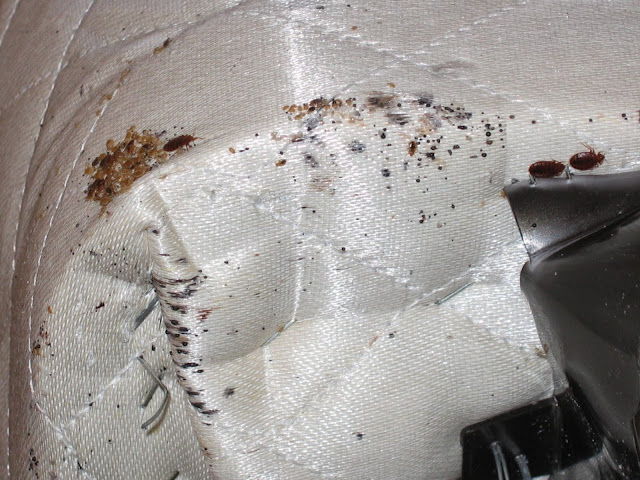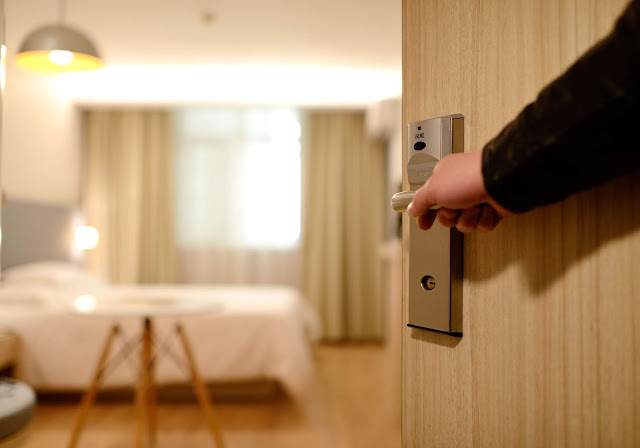Your hotel room is your home away from home, with a few exceptions: the hundreds or even thousands of strangers from every corner of the world who have slept there. It can be hard to relax on vacation when you imagine that your hotel room is a petri dish of previous guests’ germs, even if there aren’t the usual telltale signs of uncleanliness.
Studies have shown that germs frequently lurk on places like light switches, television remotes, and telephone keypads, even in hotel rooms that otherwise appear clean—disturbing evidence of what might be waiting when you wheel your suitcase into a suite.
Remember, if you have questions related to your health, always consult your doctor or medical professional. The information presented here is informative only and is not medical advice.
As physicians, we can stomach a lot when it comes to grossness, but even we get a little queasy when we think of the germs that we may be exposed to when traveling. A recent article that was published by the New York Post asked scientists about the issues that hotels and their small rooms can cause to occupant’s health, especially when it comes to bacteria and germs that are present within this space even after its routine cleanings. The article found that the average hotel room contains more harmful bacteria than what is typically found in a home, school, or even airplane. And maybe you heard about the hidden camera investigation done in Atlanta. Improper cleaning practices included not cleaning glass cups, using same gloves to clean bathroom and other areas of the room, and even using used guest towels to clean down areas in the room. And although not all viruses and bacteria will live in an environment for a long period of time it can still be a risk to humans that are exposed to airborne germs. Some of the most common infections that can be spread in indoor spaces like a hotel include cold viruses, flu, rotavirus, norovirus, staph infection, and e. coli and fungal pathogens found on surfaces like soft furniture, floors, door handles, remote controls, light switches, carpets, and bedding just to name a few.
How Long Do Germs Last on Surfaces?
According to the National Health Service, the lifespan of a germ varies depending on the type of germ and the surface that it is on. Germs can very easily become airborne and land on surfaces through direct contact, a simple sneeze, cough, or even from just breathing within a confined space. However, what happens after these actions take place, will the germs still remain contagious? According to reports from PBS, it found that the cold and flu viruses, in particular, remained contagious for up to 48 hours on hard plastic or stainless steel surfaces, while other viruses were found to stay infectious for up to 3 days. The duration of time that these viruses and bacteria can last will ultimately depend on the amount of germs released into the environment, the air flow and ventilation, and the nature of the space and surface of the environment. The bug that you hear about on cruise ships, norovirus, can survive on hard surfaces for days or weeks if the conditions are favorable. Bacteria, can live for up to weeks if the conditions are right and Methicillin-resistant Staphylococcus aureus (MRSA) bacteria, the culprits behind dangerous MRSA infections, are unfazed by many of the antibiotics that are effective in combating other staph infections. Like viruses, these germs tend to survive for shorter periods on porous surfaces than they do on nonporous ones, but they’re capable of living for days or weeks on surfaces if the circumstances are right. We love this video showing what may be hiding in your hotel room...
But, put your black light away! Here are a few other, less obsessive things you can do to rest assured you have a clean hotel room.
1. Read the Reviews!
Checking the reviews at TripAdvisor or at your short term rental like VRBO before you go is an important measure to see what others have experienced before or have seen before. We always check the reviews in detail, including photos to make sure we are staying at a location where there aren't multiple reports of dirtiness, illness or bedbugs just to name a few. You can always find reviews at other places like Booking.com, Expedia or Hotels.com.
2. Wash Your Hands
This is a practice that should start long before you get to your hotel room and is always the first thing we do upon arrival in the hotel room! Frequent hand washing has been proven to reduce the transfer of bacteria, colds and viruses to your mouth, eyes, or nose. So even if the airplane, elevator or hotel room is poorly sanitized, good hand washing will keep the germs at bay. And if you have open sores, keep them covered with a bandage.
3. Ditch the Bedspread and Avoid Soft Furniture
You’ve probably heard this one before: Most hotels do not wash heavy bedspreads after each unique guest. The frequency of laundering varies from hotel to hotel, so if the idea of an anonymous stranger cuddling up with the blanket that now lies across your bed disgusts you, call your hotel and ask how often the staff washes the bedspreads or throws. Or bring your own travel-friendly blanket which are available all over the internet or use a sleeping bag liner like these we found at Amazon, rather than touch any linens and if you are unsure about the hotel all around. Also avoid any soft furniture since many people may sit there nude and can transfer bacteria to the fabric which usually can't be cleaned easily.
4. Carry Wipes
You can start using these on the plane and when you arrive at your hotel room, clean frequently touched surfaces with wipes could will make your room a whole lot cleaner. Key places to wipe for germs include the phone, door knobs, toilet handle and seat, ice bucket, light and lamp switches, dresser handles, remote control, and bathroom faucet handles. Don't forget the doorknob to enter your room and exit your room! We choose to bring a Ziploc bag to place our remote control inside of, and yes, it still works that way. Hopefully, disinfecting wipes can be found at Amazon or your local store. Remember if you don't have wipes, using a hot washcloth and shampoo will make a difference in the number of germs!
5. Avoid the Glassware
Like we mentioned above, there is no guarantee that your room glasses and mugs aren’t simply rinsed off under the tap by the cleaning staff, or even wiped down with the same sponge that’s used to clean other parts of the bathroom. The quick way to deal with this is to run your cup under hot water for a minute or two before using it; this will kill most bacteria. Or you can use the paper or plastic cups in the room or pack a travel mug from home.
6. Be Careful Walking on the Floor
If you have extra towels in your bathroom put them on the floor. The dirtiest area is always around the toilet where dirty water or urine splash. You can always ask your hotel if they use special removers like Urine-off, or bring your own LED lamp to check the bathroom and your entire room. Don't hesitate to ask for extra towels if you want! If your hotel offers slippers, use them, especially if you have open sores on your feet or something like diabetes which makes you more susceptible to infection! We advise our readers to look for hotels with a floor surface rather than carpet if possible since they are generally cleaner.
7. Skip the Bath
The hotel tub is teeming with existing bacteria, so it’s best to skip the bath and limit exposure by showering. “Keep in mind there’s a [film] that forms over time in the tub and that holds organisms,” says Philip Tierno, a microbiologist and clinical professor of microbiology and pathology at NYU School of Medicine.
But even showering isn’t without concern — the moist setting is a breeding ground for fungus (which can cause athlete’s foot), and mold (which can trigger allergies in people with sensitivities, prompting sneezing, nasal congestion and itchy, watery eyes). “If you smell mildew, you’ve got mold exposure,” says Dr. Clifford Bassett, medical director of Allergy & Asthma Care of New York.
Tierno advises running the hot water for one minute and squirting some shampoo or shower gel onto the bath surface before stepping in. “You’re reducing the number of organisms that collect,” he says.
8. Look for Bedbugs
To find evidence of bedbugs, look first under the mattress. Do you see reddish-brown spots (the dried excrement of the insects) on the underside of the mattress or on any other part of the bed? It’s hard to spot the actual bugs—these guys are sneaky and their flat bodies allow them to hide in the smallest mattress crevices during the day—but it is possible to see some bugs, especially if there’s a major infestation. You can also check between couch cushions or between the carpet and the wall. If you discover the above signs of bedbug life, call the front desk immediately and do NOT put your suitcase, your coat, or any of your belongings on the bed or near the site of the infestation. In most cases, the hotel staff will already be aware of the situation and will move you to another room or if not speak to a manager immediately.
 |
| Courtesy of BedBugsChicago.com |
Maybe you want to take a few pairs of gloves with you. Washing hands is the best defense but we understand the "ick" factor!
Bottom Line:
As an avid traveler, the importance of a clean hotel room cannot be stressed enough. While the measure we have discussed above will help you avoid getting sick, they are not foolproof, and the biggest piece of advice that we can give you is to wash your hands regularly! Hand sanitizer is also helpful but a thorough hand cleaning, using soap and warm water -- wash for as long as it takes you to sing the "happy birthday to you" song TWICE -- and keeping your hands out of your face is the best thing you can do to stay healthy. If you are concerned about something in particular related to your health, speak to your medical provider before you leave on your vacation to put a plan in place!
Remember, if you have questions related to your health, always consult your doctor or medical professional. The information presented here is informative only and is not medical advice.






To my mind, if you rented a room in a luxurious hotel, it will definitely be clean. But, if you want to have a clean room, you will have to pay much for it.
ReplyDeleteI always tried not to think much about that, because it scares me. I'll definitely try to use some of your advices. Thank you for sharing that.
ReplyDelete